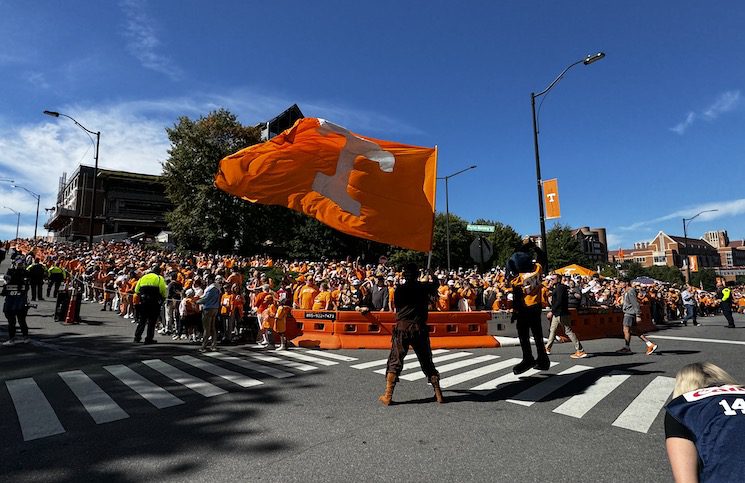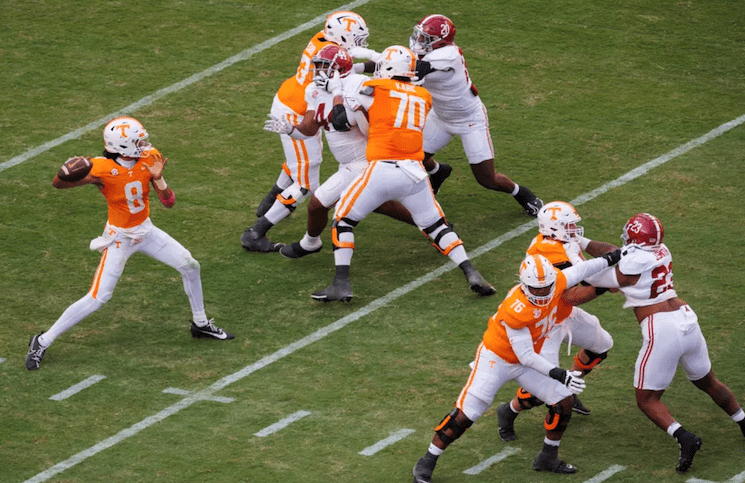NCAAM: Baylor Repeat
One of the most common complaints from the 2021 college football season was around the act of faking injuries. Throughout the season, in specific moments, defensive players would “fake” an injury on the field to buy his team some extra time to either prepare or rest. And while yes, this isn’t a brand-new issue, it has become one of the league’s most substantianal issue as teams, like Tennessee, start playing faster and faster on offense.
According to a report from Nicole Auerbach of The Athletic on Monday, Steve Shaw, the National Director of Officials, told The Athletic that “faking injuries is going to be ‘a big topic’ at the next meeting of the NCAA Football Rules Committee on March 1.”
“Obviously, we want to take feigning injuries out of the game,” Shaw said in the report from The Athletic. “It’s a bad look for the game. It’s an integrity issue. If you have a feigned injury, it garners an unmerited timeout for your team. We’re really looking at: What’s the next step to move away from that?”
Ultimately, if a player goes down while on defense, that team then essentially gets a free timeout to check on the player. While people aren’t calling for less attention to injuries, it is an unfair disadvantage for a team that is moving the ball with pace and tempo on offense. For Tennessee, speficially, the Vols’ offense is one that wants to keep the defense on their heels and behind mentally. However, if their opponent gets a free 60-second break due to an injury every fourth play, it allows them to unfairly collect themselves.
See Also from RTI: Former Tennessee Commit, Oak Ridge Native Heading to the Super Bowl
While there are certainly more than two, Tennessee fans will remember two instances in particular where teams were accused of faking injuries while the Vols were on offense: against Kentucky and against Purdue in the Music City Bowl. After both instances, Heupel spoke about his reaction during the respective postgame press conferences.
While the Vols were on the road against Kentucky, Wildcat defenders were often going down during the final Tennessee drive on offense. While it is always difficult to address the severity of a player from TV or the stands, there did seem to be instances of players faking injuries to buy time.
“At times, I think people do that,” Heupel said after the Kentucky game about faking injuries to gather time. “In this football game we moved the ball with tempo. And guys end up finding a way to go down and allowing substitutions to happen or just change the momentum of the football game.”
Then, after the Music City Bowl against Purdue, Heupel actually spoke of a specific interaction he had with the refs after injuries started to pile up late in the game with Tennessee on offense.
“Yeah, you know what’s crazy is the officials wanted that tonight,” Heupel said regarding a potential rule change for injured players. “I thought that was pretty comical that they came up and said that to me.”
Heupel went on to shed some more light on the statement.
“Yeah, they think there should be a rule change,” Josh Heupel said while speaking about the referees.
Tennessee HC Josh Heupel on his conversations with the referees regarding players faking injuries on the field.
Heupel used the word “comical” to describe the interaction.#MusicCityBowl pic.twitter.com/qZZGNfK2Hi
— Rocky Top Insider (@rockytopinsider) December 31, 2021
All in all, it does look like the concept of faking injuries will be atop the NCAA Rules Committee’s agenda. And for the sake of the integrity of the game, it needs to be. No one is calling for injured players to receive less attention on the field. When there is an injury, that athlete should receive any attention they need. However, now that teams are figuring out how to bend the rules to take advantage, there needs to be change.
Currently, there are no rules set for how many injuries a team can have during a game or during a drive. Nor is there any rule about holding a player out of competition for extended time if they are to stop the game for an injury. It isn’t just Tennessee receiving the short end of the stick, either. Not only is this happening all across the country, but Tennessee wasn’t completely innocent of the same thing either. And look, why not? If it fits within the rules and gives a team an advantage, well, by all means, use it.
And that right there is the ultimate reason why it is necessary for there to be a rule change. Because the current rules are allowing unfair, legal, advantages in critical moments of the game. And according to Auerbach’s reporting for The Athletic on Monday, it does look like Steve Shaw and the NCAA Rules Committee will be prioritizing this issue for the future.





3 Responses
As far as faking injuries go, a player who goes down injured should have to sit out the rest of the quarter or it least 5 to 7 game time minutes if its at the end of a quarter for several reasons. Gives ample time for the training staff to go over said players injuries. The player cannot just jump right back into the game aftet 3 plays. It makes a player think 2 to 3 times about whether faking an injury is worth missing half a quarter or more of play.
3 rules to fix the issue: (the intent is to prevent unfair advantages and incentives to dropping when they are either not injured or could safely make it to the sideline rather than stopping the game).
1 the player is out for the drive (or 4 plays, but this would be more difficult to track). If he is really injured, then one play isn’t helping, if it was so minor he could come back in after just one play then he should have made it to the sideline in the first place, and not disrupted the game, and deserves to sit the drive.
2 the team with the injured player can not substitute players unless the other (offensive) team does first. This is a major unfair advantage that incentivizes dropping. Needs to be stopped.
3 neither team can meet/huddle with anyone from the sidelines. Must huddle or remain at/near the line of scrimmage. Another major incentive to dropping that needs to be stopped.
If the team does any of these 3 things during a injury timeout then they can either (1) use a timeout, or (2) be given a penalty of “x” yards (10-15), an automatic 1st down, and stopped clock.
The outcome of a game should not be determined by some timely injury timeouts giving free relief to a defense and disrupting the momentum of drives. Injuries should not be strategy in football.
Reasonable suggestion in my opinion